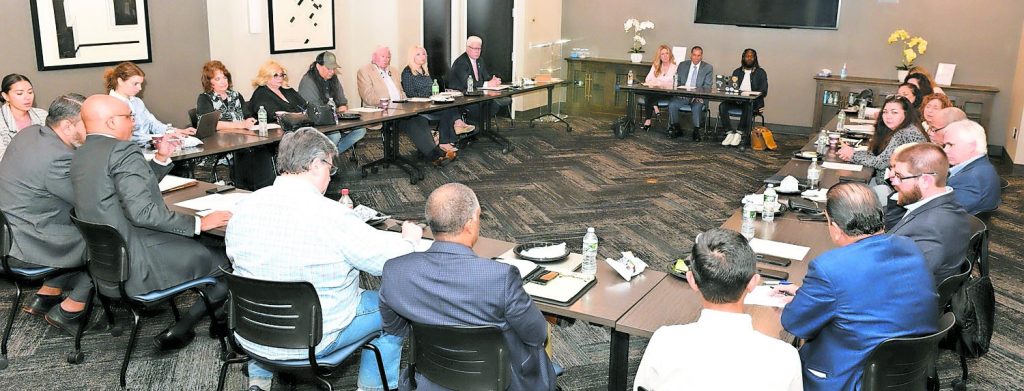6 Community Work Groups Established

To ensure the community’s voice is heard during the design phase of the Sands New York destination resort, the company has welcomed community members to working groups to share their ideas, concerns and aspirations for the development.
“With the vital input from the working groups, the goal is for the development to be a true co-creation between the community and Sands. By identifying local opportunities, needs, concerns, and ideas across key sectors and working collectively to prepare for opportunities and mitigate issues, this project has the potential to lift the entirety of the region,” said Robert G. Goldstein, Las Vegas Sands Chairman and CEO.
The working group categories include Environment and Sustainability, Business Development and Tourism, Transportation and Infrastructure, Workforce Development, Community Partnerships, and Public Safety.
Each group is led by two co-chairs — one expert in the subject matter and one community member that has a particular background or interest in the working group area.
Here is more about the goals of each work group and how you can get involved.
Environment & Sustainability
The Environment and Sustainability working group is focused on minimizing any adverse environmental impacts to the surrounding communities while also trying to capitalize on the opportunities the site presents in the area of sustainability with a particular focus on creating healthier communities.
To limit the destination’s environmental impact, this group is focused on protecting community resources including air and water as well as limiting waste. Many ideas have been generated out of this group already including a rooftop farm with community access and education programming, green roofs, renewable energy concepts, as well as state-of-the-art water conservation technologies, as well as creating sustainable transit methods that include walking and biking systems.
Business Development & Tourism
Sands’ new development is expected to procure between $300-$500 million annually in goods and services and the company estimates that at least 75% of that can be sourced locally. The task of this work group is to make sure that opportunity isn’t missed by Long Island businesses.
Working collectively, the group is identifying education and capacity building needs within the small business community to make sure they are ready and up to the job. In addition, the working group members are also brainstorming different ideas that could promote outside businesses and attractions on Long Island, including a sophisticated concierge program, on-site kiosks for small businesses to offer their products, and a wedding vendor guide for future brides and grooms.
Stemming out of this work, Sands is already procuring goods and services locally including Mama’s Custom Cookies in Wantagh, A & M Supplies Network in East Meadow, and Tristar Graphics in Hempstead.

Transportation & Infrastructure
Transportation and Infrastructure has the task of working with Sands on traffic, transit options, technology infrastructure, and connectivity of the site to other local attractions like Museum Row.
Sands has embarked on a massive traffic study including over 75 locations, which was expanded after meeting with the working group. In addition, various ideas including placement of entrances, no-cost parking to prevent guests from using neighborhood streets to park, and strategies for the overall site plan have been offered to create a buffer for surrounding communities.
When the traffic study is finalized, the working group will work with Sands on the mitigation strategies proposed by the traffic engineers to ensure that best practices are implemented and surrounding communities are protected.
Workforce Development
With Sands expecting to create over 5,000 new permanent jobs and 8,500 construction jobs should the company win the gaming license, this working group is dedicated to intentionally and strategically creating bridges to the communities, strengthening the on-ramps to jobs and removing barriers to employment for unemployed and underemployed Long Islanders.
With starting salaries expected to be $60,000-$70,000 annually with real career opportunities. It is vital to the success of the development that local residents have the access and tools to not only get the job, but to grow the job into a career.
This working group includes grassroots organizations from across Long Island, workforce development experts, several local colleges, and interested community members. Collectively with Sands, they are working to develop programs that can be put into place now to ensure local residents are employment ready for both construction and post-construction phases.
Community Partnerships
This work group is collaborating with Sands to identify and address goals, challenges and opportunities at the Coliseum site, as well as within the surrounding communities.
Ideas from this working group include supporting veterans, providing meeting space within the new development for community groups, addressing food insecurity of area residents, offering discounts to residents and veterans, creating professional internship programs for students, and offering theater space for local schools to use.
Public Safety
Ensuring public safety both within the new development and in the surrounding community must be the top priority. As such, this group has begun working with Sands to understand how internally Sands develops their security plans, as well as externally sharing the concerns of local residents and working on mitigation strategies that will ensure improved safety for all residents.
While topics covered include policing, other topics working group members have raised include diminishing participation in local fire departments and lack of safe, healthy activities for young adults after school.
